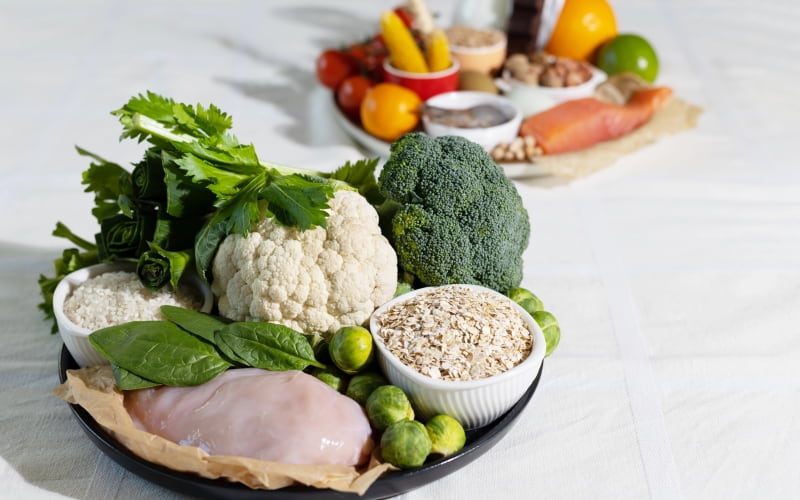Профессиональный аккаунт
У вас пока нет действующего кабинета в МИС "МедЭлемент". Создать кабинет частной практики?
Even the healthiest foods can cause digestive problems. Symptoms of food intolerance: bloating and pain in the abdomen, windiness, skin rashes, constipation and diarrhea.

Food intolerance is an immune reaction of the body to a particular food. As a rule, it manifests itself externally through rash, itching, urticaria, swelling and - an extreme degree - anaphylactic shock. The latter is associated with severe breathing difficulties and can be fatal.
Food intolerance occurs when the body cannot digest a certain food (e.g., milk, eggs) due to the absence or deficiency of an enzyme responsible for its absorption.
This manifestation is also called leaky gut syndrome or irritable bowel syndrome (IBS). In this syndrome, the stomach ceases to absorb useful substances and there are problems with digestion.Symptoms include bloating and abdominal pain, windiness, skin rashes, constipation, and diarrhea. Intolerance is much more common than allergy.
Every year the number of people suffering from food intolerances is growing. The situation is worsened by the fact that not everyone can distinguish intolerance from an allergic reaction. At the same time, there is food intolerance, which is very difficult to diagnose, because a reaction to an undesirable product can occur within a few days. This type of food intolerance occurs in more than 20% of people. This type of intolerance is quite difficult to treat because the symptoms are not immediately apparent.
And because intolerance does not appear immediately, a person can suffer from the disease for many years without being aware of it. This may result in the disease becoming chronic and untreatable. People with food intolerance often suffer from overweight, diseases of the gastrointestinal tract and dermatitis.
In a healthy body, products are broken down effortlessly and sent to the bloodstream. In the case of food intolerance, the breakdown of products is not complete and large macromolecules enter the bloodstream. This results in the gastrointestinal tract diseases, allergic reactions.
Often the causes of food intolerance lie in existing problems with the gastrointestinal tract, frequent stress. This disease can also be dependent on the quality of the products, namely artificial coloring agents and additives contained in them.
The symptoms of food intolerance are complex and non-specific. Experts identify the main symptoms that occur in the first few hours after consuming the product. These are systemic allergic reactions and skin reactions.
Systemic allergic reactions include:
- Itchy skin
- Numbness of the tongue
- Swelling of the oral mucosa
- Sudden drop in blood pressure
- Constipation or diarrhea
- Spasms and colic in the abdomen
- Irritable bowel symptoms
- Discomfort in the mouth
- Nausea and vomiting
- Anaphylactic shock
Skin reactions are similar in children and adults. As a rule, the primary reaction to the allergen product in infants is skin rashes, itching, diaper rash. In adults, food intolerance is accompanied by urticaria or atopic dermatitis.
Protein intolerance affects 40% of people, lactose intolerance is observed in half of the world's population. The percentage is even higher in Eastern countries and South Africa.
If a person can be allergic from childhood, intolerance usually manifests itself over time, after the age of 20-25.
With age, one does not need sugar and milk in the amount he/she used to consume in childhood to accumulate energy. The metabolism slows down, which means that it becomes more and more difficult for the body to digest certain elements in the same volumes. Ignoring this and continuing to load the body will lead to inflammation in the intestines.

1. Gluten-containing cereals wheat, rye, barley
Gluten is a protein that is also called vegetable gelatin. Gluten is found in large quantities in grain and cereals - wheat, rye, barley. Celiac disease, gluten intolerance, is the end stage of the entire autoimmune spectrum of gluten sensitivity. Today, one can have his/her samples taken to determine if there is any intolerance. You can follow a gluten-free diet for a month and observe your well-being.
2. Vegetables of the nightshade family
Tomatoes, peppers, eggplant, and potatoes contain alkaloids that cause inflammation in some people. These vegetables also contain lectins, highly toxic proteins, in their skins, seeds, and leaves.
3. Beans
Beans, lentils, chickpeas, edamame are often the mainstay of nutrition for those who follow a plant-based diet. Legumes are high in lectins, which some people find difficult to absorb.
4. Eggs
Egg white can cause intolerance and inflammation.
5. FODMAP
This abbreviation stands for: Fermentable Oligosaccharides, Disaccharides, Monosaccharides and Polyols. These sugars are not fully digested in the intestines and are fermented (go through the process of fermentation) by intestinal bacteria. During the fermentation process, hydrogen and methane gases are released, which can lead to intestinal distension and cause symptoms such as pain, windiness, bloating, constipation, and diarrhea.
Most high FODMAP foods are healthy. But what suits one person may not suit another. This is a list of foods to avoid or strictly limit if you experience irritable bowel symptoms:
- Vegetables: Artichokes, asparagus, beets, celery, garlic, onion, leek, savoy cabbage, sweet peas, corn, and legumes.
- Fruits: apples, mangoes, nectarines, peaches, pears, plums, watermelon.
- Dairy products.
- Wheat, rye.
- Nuts: cashews, pistachios.
The goal of treating FODMAP intolerance is to heal the gut. At the end of the course of treatment, you can include your favorite foods back to the diet.
6. Dairy products
Casein, a protein found in dairy products, very often causes hypersensitivity. The fact is that cows on large dairy farms are usually given antibiotics and hormones, they eat combined feed instead of grass. Milk is usually pasteurized and defatted. Nutrient deficiency is compensated for with synthetic vitamins. Fermented dairy products (sour milk) such as kefir and yogurt are generally better tolerated.
7. Nuts and seeds
These products are also rich in lectins. In addition, store-sold nuts are usually coated with soybean or canola oils, which contain partially hydrogenated trans fats. These fats are cheap and harmful. Therefore, nuts are best bought raw, soaked and consumed in reasonable quantities.
- Overweight with a normal, rational diet, without taking into account diseases of the endocrine system and hormonal changes.
- Inability to gain weight, with enough food.
- A constant feeling of fatigue, apathy, unwillingness to engage in any activity. Feeling that food does not charge the body with energy, but rather consumes it.
- After taking certain foods, weakness in the body, dizziness, and stomach problems appear.
- Occurrence of skin reactions.
- Swelling, pain in muscles and joints.
Proper diagnosis and treatment can help manage food intolerance. After identifying the unwanted product, you need to remove it from your diet. Often, these are several products at once. Or, for example, beans. In this case, you need to remove all products of this group from the diet. After all, a product that causes food intolerance becomes not only useless, but also dangerous. For this reason, it is very important to identify the cause of food intolerance in time and remove the allergen from the diet.